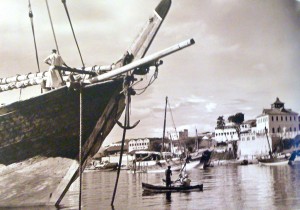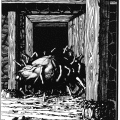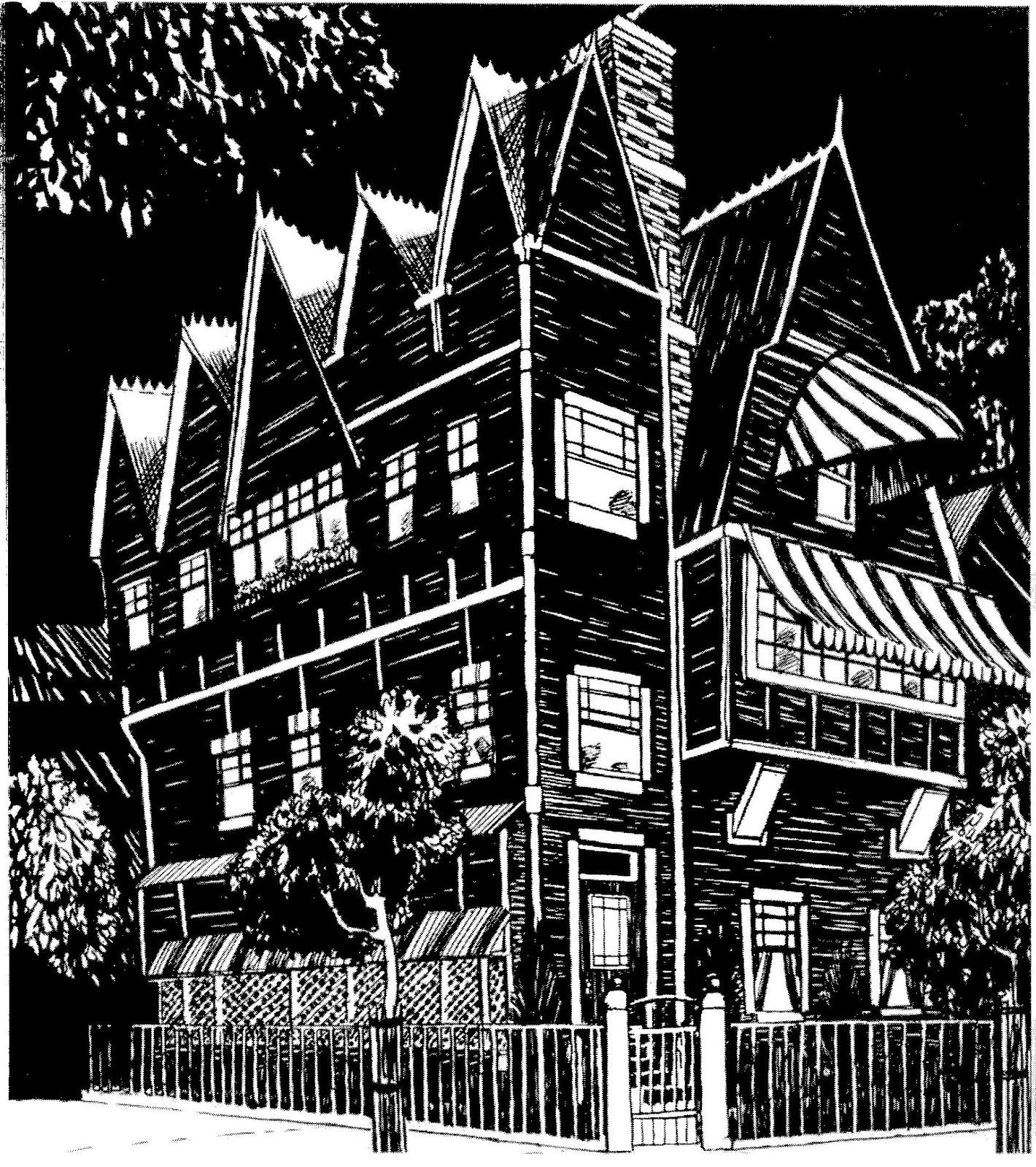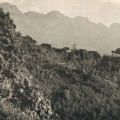 The team bypasses Cairo altogether to head straight for the source! Many clues point to Kenya as the possible epicenter of the conspiracy. The Carlyle Expedition did disappear there, after all. Before the investigators can pick up the trail in Nairobi, they must first pass through the port city of Mombasa. The cults of the Crawling Chaos are now on the lookout for them, so travel will be more difficult. What strategy will they use to defeat the cultists? What other dangers lie in wait for them? Find out as the Kenya chapter begins!
The team bypasses Cairo altogether to head straight for the source! Many clues point to Kenya as the possible epicenter of the conspiracy. The Carlyle Expedition did disappear there, after all. Before the investigators can pick up the trail in Nairobi, they must first pass through the port city of Mombasa. The cults of the Crawling Chaos are now on the lookout for them, so travel will be more difficult. What strategy will they use to defeat the cultists? What other dangers lie in wait for them? Find out as the Kenya chapter begins!
Podcast: Play in new window | Download (Duration: 3:52:50 — 106.8MB)
Subscribe: RSS






PORTS!!!! We should have flown everywhere…or used the Yithian Express.
you’ve only come into port twice so far in this campaign! literally doesn’t have a lot of currency! nobody was watching you guys arriving in LA!
H Rider Haggard references are always appreciated, even if I…haven’t actually read She. to my sheme. maybe I should visit Audible, I adored King Solomon’s Mines as a kid.
I’m two-thirds convinced that skipping Cairo is going to mean the Black Pharaoh makes it to Earth in the end. thanks for World War 2, NERDS.
yesss no more chloroform that’s chlorofirmative action for us nerds who can’t cope with free superpowers in realistic-ish games
good on you guys for managing to pull off an op without going loud for once! WHILE WEARING GOING LOUD PAYDAY MASKS. truly, the pillars of the earth trembled over this one.
I think this qualifies as the most time any RPPR game has ever spent deliberating over the disposal of a body. maybe A Very Thorough Murder, where they, like, set a silo on fire or something? that was pretty bad, too. less overtly ghoulish, though.
this concludes our broadcast series of unconnected comments. I hear you’ve gone on to better things, Sean! we’ll miss you!
@Crawlkill: Thanks! Ann and I are, indeed, going to be leaving town so we won’t be part of RPPR in the future. We will certainly miss the games and everyone in the RPPR crew. However, Ross has probably a year’s worth of recordings of us in games (including several episodes of this campaign and the post-mortem) still to be posted, so we won’t really be “gone” for quite some time. 🙂
Question: what is this overspend pool thing that Bill mentions?
@Wyrdling New cherries for Trail of Cthulhu – look at Quick Reflexes in this article: http://pelgranepress.com/site/?p=15288
Preparedness to have forged documents. Priceless.
“Fun” pedantic legal fact!
The “breaking” in “Breaking and Entering” is actually defined extremely broadly; it essentially covers any method of gaining entry that you take with criminal intent. It doesn’t require any particular means of contrevention of the lock, so it’s still “breaking” to open a lock with a set of picks, or with a key, or even to just open a door or window that isn’t locked.
So it was, in fact, B&E, and not just E 🙂
@SW Interesting. Thanks for the clarification!
@Kiljoy and Ann. Best of luck in your future endeavors. Thank you for all the entertainment!
If you have time before the move Kiljoy, would you mind mentioning your academic specialization? If it is Africa, would you also mind posting a not-time-intensive series of links to myths, legends and history that would be interesting from a game perspective or just sparked your curiosity? I’m sure more than one person would appreciate it.
Ah, body disposal. The bane of investigators. I liked the idea of selling it to shamans for spare parts. Surely nothing bad can result from using a mythos sorcerer as a spell component. 🙂
@Twisting H: My specialties are interwar Germany, the Mandates System, and interwar sub-saharan Africa, specifically East Africa (Kenya, Tanzania, Rwanda, Burundi), Southwest Africa (modern Namibia), and South Africa. As to “links,” what exactly are you looking for? Unfortunately, most of the material online about Africa is incredibly suspect, so books are the better course of action for researching games on colonial and mandate Africa. For a range of topics, including decolonization, the Mandate system, the impact of empire on European and African culture, colonialism in Africa, etc., I would suggest starting with the following works (this is just the tip of the iceberg…listed alphabetically):
Beckert, Sven. Empire of Cotton. A Global History. NY: Alfred Knopf, 2014.
Burbank, Jane, and Frederick Cooper. Empires in World History. Power and the Politics of Difference. Princeton, NJ: Princeton University Press, 2010.
Callahan, Michael D. A Sacred Trust: The League of Nations and Africa, 1929-1946. Brighton: Sussex Academic Press, 2004.
———. “‘Mandated Territories Are Not Colonies’: Britain, France, and Africa in the 1930s.” In Imperialism on Trial: International Oversight of Colonial Rule in Historical Perspective, edited by R.M. Douglas, Michael D. Callahan, and Elizabeth Bishop, 1–20. Lanham, MD: Lexington Books, 2006.
———. Mandates and Empire: The League of Nations and Africa, 1914-1931. Brighton: Sussex Academic Press, 1998.
Cockram, Gail-Maryse. Southwest African Mandate. Capetown: Juta & Co. Ltd., 1976.
Conrad, Sebastian. German Colonialism. A Short History. Cambridge: Cambridge University Press, 2012.
Cooper, Frederick. Decolonization and African Society: The Labor Question in French and British Africa. Cambridge: Cambridge University Press, 1996.
Crais, Clifton, and Pamela Scully. Sara Baartman and the Hottentot Venus: A Ghost Story and a Biography. Princeton, NJ: Princeton University Press, 2010.
Gibson, James, and Jamie Monson, eds. Maji-Maji: Lifting the Fog of War. Boston: Brill, 2010.
Harlow, V., and E.M. Chilver, eds. History of East Africa. Vol. 2. Oxford: Oxford University Press, 1965.
Hayes, Patricia, Jeremy Silvester, Marion Wallace, and Wolfram Hartmann, eds. Namibia Under South African Rule. Mobility and Containment, 1915-46. Oxford: James Currey, 1998.
Henderson, W.O. The German Colonial Empire, 1884-1919. London: Frank Cass & Co. Ltd., 1993.
Hobsbawm, Eric .J. The Age of Empire: 1875-1914. NY: Vintage Books, 1987.
Hobsbawm, Eric J., and Terrence Ranger, eds. Invention of Tradition. NY: Cambridge University Press, 1983.
Illife, John. A Modern History of Tanganyika. Cambridge: Cambridge University Press, 1979.
Klein, Martin A. Slavery and Colonial Rule in French West Africa. NY: Cambridge University Press, 1998.
Kundrus, Birthe. Moderne Imperialisten: Das Kaiserreich im Spiegel der Kolonien. Köln: Böhlau, 2003.
Langbehn, Volker, ed. German Colonialism, Visual Culture and Modern Memory. London: Routledge, 2010.
Lewerenz, Susann. “‘Loyal Askari’ and ‘Black Rapist’–Two Images in the German Discourse on National Identity and Their IMpact on the Lives of Black People in Germany, 1918-1945.” In German Colonialism, Race, the Holocaust and Postwar Germany, edited by Michael Perraudin and Jürgen Zimmerer, 173–186. NY: Routledge, 2011.
Manela, Erez. The Wilsonian Moment: Self-Determination and the International Origins of Anticolonial Nationalism. Oxford: Oxford University Press, 2007.
Mazón, Patricia, and Reinhild Steingröver, eds. Not so Plain as Black and White: Afro-German Culture and History. Rochester, NY: University of Rochester Press, 2005.
Mbembe, Achille. On the Postcolony. Berkeley: University of California Press, 2001.
O’Donnell, Krista, Renate Bridenthal, and Nancy Reagin, eds. The Heimat Abroad: The Boundaries of Germanness. Ann Arbor: University of Michigan Press, 2008.
Penny, H. Glenn. Objects of Culture: Ethnology and Ethnographic Museums in Imperial Germany. Chapel Hill: Universiy of North Carolina Press, 2002.
Rogowski, Christian. “The ‘Colonial Idea’ in Weimar Cinema.” In German Colonialism, Visual Culture, and Modern Memory, edited by Volker Langbehn, 220–238. London: Routledge, 2010.
Schilling, Britta. Postcolonial Germany. Memories of Empire in a Decolonized Nation. Oxford: Oxford University Press, 2014.
Schmidt, Elizabeth. Foreign Intervention in Africa: From the Cold War to the War on Terror. NY: Cambridge University Press, 2013.
Shepard, Todd. The Invention of Decolonization: The Algerian War and the Remaking of France. Ithaca: Cornell University Press, 2006.
Short, John Phillip. Magic Lantern Empire. Colonialism and Society in Germany. Ithaca: Cornell University Press, 2012.
Slonim, Solomon. Southwest Africa and the United Nations: An International Mandate in Dispute. Baltimore: John Hopkins University, 1973.
Smith, Woodruff D. The German Colonial Empire. Chapel Hill: University of North Carolina Press, 1978.
Steinmetz, George. The Devil’s Handwriting: Precoloniality and the German Colonial State in Qingdao, Samoa and Southwest Africa. Chicago: University of Chicago Press, 2007.
Walther, Daniel J. Creating Germans Abroad: Cultural Policies and National Identity in Namibia. Athens: Ohio University Press, 2002.
———. “Sex, Race and Empire: White Male Sexuality and the ‘Other’ in Germany’s Colonies, 1894-1914.” German Studies Review 33, no. 1 (2010): 45–72.
Webster, Wendy. Englishness and Empire, 1939-1965. Oxford: Oxford University Press, 2005.
Wildenthal, Lora. German Women for Empire, 1884-1945. Durham, NC: Duke University Press, 2001.
Winrow, G.M. The Foreign Policy of the GDR in Africa. Cambridge: Cambridge University Press, 1990.
Zimmerman, Andrew. Alabama in Africa: Booker T. Washington, the German Empire, and the Globalization of the New South. Princeton, New Jersey: Princeton University Press, 2010.
Aw, Sean. Bustin’ out that sweet, sweet Chicago citation style. Too bad I never got a chance to play a game with you and Anne. You wouldn’t happen to be moving to Columbia, would you? 🙂
It’s a treasure trove of academic goodness! If only my own research didn’t prevent me from getting in on this footnotey goodness 🙁
I know it was a tough fight (kinda) but throwing handfuls of sand and loaning points to other players?
Also I’m not sure if even a REALLY, REALLY BIG bucket of sand would have any real effect on a floating ball of fire.
Plus I really hate this Preparation mechanic as it seems that it lets things appear by magic, rolling to have a torch okay no problem but weapon caches? it seems a little too open to abuse as does the open language slots and the Mythos spend which gives you all knowledge from some hand waved placed.
Are these things solid Trail or house rules based on the system?
Thanks very much Sean.
Nice job Ross on the great insight into the mindset of the glorious cat. Retroactively, they might have rain barrels there though not good for drinking but good for putting out fire elemental enemies.
Though I do think the players are getting away with stuff on the preparedness check like the one in here. If I recall a 0-1 point spend plus maybe a roll would be for something rather common but just not allowed or bulky/nearby or not usually carried & a 2+ point spend again maybe a roll as well for something like in this scenario as it’s rather specific & the people right off the boat. Maybe if they were traveling the city for a day or two then getting to focus in on the warehouse but right off the boat seems a bit of a stretch. At least Ross reigned it in rather soon but still irksome to hear it happen.
Also Ross gets -5 points for getting the unreal casting magic very cinematic/awesome but naming off the monster out of the book to a bunch of new people like they’ve been playing Call of Cthulhu for years.